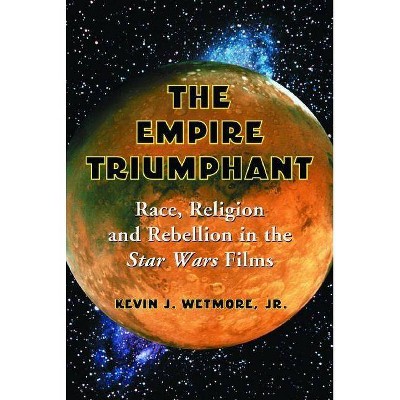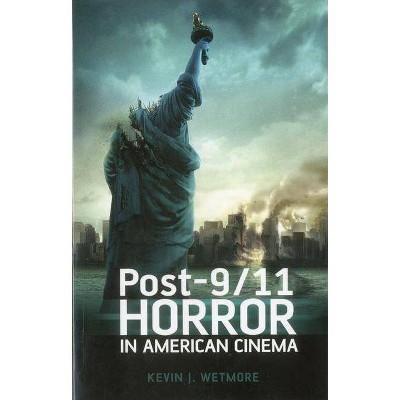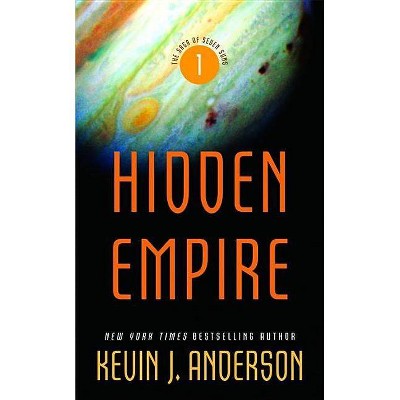Empire Triumphant - by Kevin J Wetmore (Paperback)

Similar Products
Products of same category from the store
AllProduct info
<p/><br></br><p><b> About the Book </b></p></br></br>George Lucas's first Star Wars trilogy shows the influences of its era; Cold War tension is evident in its theme of rebellion against totalitarianism. Recent entries in the Star Wars saga--The Phantom Menace (1999) and Attack of the Clones (2002)--are much more concerned with evil corporations, terrorists, and the corruption of the political process. Each film is influenced by the times in which it was released, but also by cultural subtexts and by other films that had direct and indirect effects on Lucas as writer, producer, and director.<BR> This work focuses on all six Star Wars films. The first topic of this multifaceted examination is how the films use the language of colonialism ("The" Rebellion, "The" Empire) to emphasize the idea of imperialism. Next the author looks at how Asian influences--including religious undertones from Taoism and Buddhism and the works of Kurosawa and other Asian filmmakers--provide a subtext for much of the action. Next the discussion turns to the representation of people of color in the Star Wars universe, and how other ethnicities are represented overall, particularly through the literalization of the word "aliens." These topics of discussion provide for penetrating conclusions about Lucas's films and how they represent race, religion, and rebellion.<p/><br></br><p><b> Book Synopsis </b></p></br></br>George Lucas's first Star Wars trilogy shows the influences of its era; Cold War tension is evident in its theme of rebellion against totalitarianism. Recent entries in the Star Wars saga--<i>The Phantom Menace</i> (1999) and <i>Attack of the Clones</i> (2002)--are much more concerned with evil corporations, terrorists, and the corruption of the political process. Each film is influenced by the times in which it was released, but also by cultural subtexts and by other films that had direct and indirect effects on Lucas as writer, producer, and director. This work focuses on all six <i>Star Wars</i> films. The first topic of this multifaceted examination is how the films use the language of colonialism (The Rebellion, The Empire) to emphasize the idea of imperialism. Next the author looks at how Asian influences--including religious undertones from Taoism and Buddhism and the works of Kurosawa and other Asian filmmakers--provide a subtext for much of the action. Next the discussion turns to the representation of people of color in the <i>Star Wars</i> universe, and how other ethnicities are represented overall, particularly through the literalization of the word aliens. These topics of discussion provide for penetrating conclusions about Lucas's films and how they represent race, religion, and rebellion.<p/><br></br><p><b> Review Quotes </b></p></br></br><br>"looks at elements of colonialism and imperialism in the two trilogies and pinpoints Asian influences, including Taoism, Buddhism, and the works of Akira Kurosawa"--<i>South Dade News Leader</i>; "George Lucas has been making a galaxy far, far away safe for white people...primarily about perceptions of the films as seriously marred by racism, colonialism and improper culture appropriation"--<i>Fort Worth Star-Telegram</i>; "shows the influences of its era...theme of rebellion against totalitarianism...evil corporations, terrorists, and the corruption of the political process...the discussion turns to the representation of people of color in the Star Wars universe, and how other ethnicities are represented overall, particularly through the literalization of the word 'aliens'...penetrating conclusions about Lucas's films"--<i>SFRevu</i>.<br><p/><br></br><p><b> About the Author </b></p></br></br><b>Kevin J. Wetmore, Jr., </b> is a professional actor and director whose previous books have covered topics ranging from <i>Star Wars</i> to Renaissance faires. He is a professor and chair of the theater department at Loyola Marymount University in Los Angeles, California.
Price History
Price Archive shows prices from various stores, lets you see history and find the cheapest. There is no actual sale on the website. For all support, inquiry and suggestion messagescommunication@pricearchive.us




















